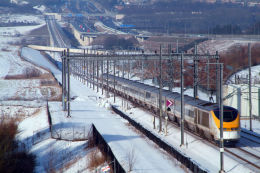Posted 3rd March 2009 | No Comments
Battle of the Big Freeze

Top: A speed-restricted Eurostar travelling down the Medway Valley on High Speed One.
AS the worst winter weather for almost 20 years brought many parts of the country to a standstill, rail staff battled the elements to try to keep most of the rail network open for business.
But in London and the South East the fierce blizzards and ice rendered untreated roads impassable for many staff, stopping them getting to work and causing many train delays and cancellations
On Monday 2 February, when the full fury of the Arctic weather took hold, London Underground services were decimated, Southeastern services could not reach the capital, and those from the coast were restricted to Gillingham, Faversham and Tonbridge.
High Speed One was restricted to 137mph with late-running Euro-star trains also experiencing disruption on the Continent.
Overnight ‘ghost’ and anti-icing trains enabled some Southern services to reach London, but South West Trains’ suburban services were severely disrupted. First Capital Connect services from Luton and Bedford were forced to terminate at Moorgate during the worst of the weather.
Such was the demand for information that the websites of National Rail, SWT and Transport for London were at times overwhelmed by the sheer volume of anxious passengers checking on the latest situation.
Virgin Trains ran a contingency timetable of two trains an hour to Birmingham and Manchester, while First Great Western provided similarly restricted services.
All routes remained open in the East Midlands and Anglia, where generally good services were able to run. And while Scotland escaped the worst of the weather, snow teams on standby had to clear the previous week’s snow from the Elgin to Inverurie and Highland routes.
With extensive deployment of icebreaker locos, anti-icing trains and mini-snowploughs, as well as maintenance teams to keep lines clear and check infrastructure at key locations, Network Rail and train operators worked closely to minimise disruption.
Network Rail chief executive Iain Coucher said: “Thousands of employees from all parts of the country were involved in dealing with the worst of the weather to keep passenger and freight services running, despite difficulties for many in getting to work themselves.”
He added: “It is testament to our teamwork and determination that we kept so many services running in very difficult conditions.”
